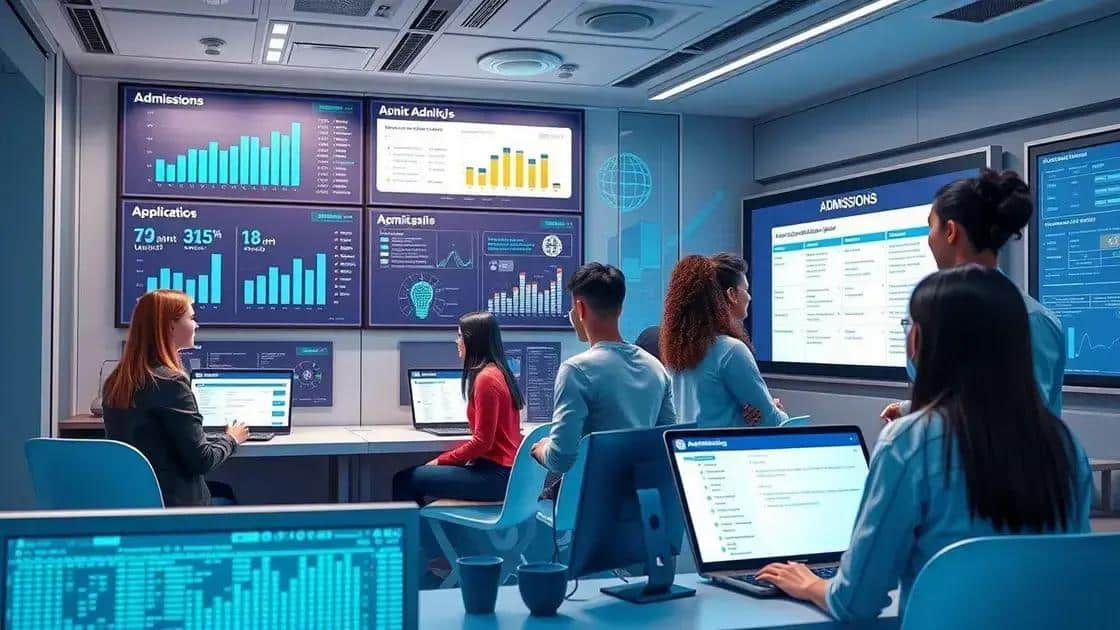College admissions AI trends that could change everything

College admissions AI trends are reshaping the process by enhancing efficiency, promoting fairness, and personalizing student interactions, leading to more informed and equitable selections of applicants.
College admissions AI trends are becoming increasingly influential in shaping the future of academic applications. But how do these advancements truly impact students and institutions?
Understanding AI’s role in college admissions
In today’s world, understanding AI’s role in college admissions is crucial for students and educators alike. As more institutions embrace technology, the way applications are evaluated is changing.
AI technology is being used to analyze data, predict outcomes, and enhance decision-making processes. This means that what once took weeks of manual analysis can now happen in seconds. Institutions can review thousands of applications efficiently while focusing on the quality of selection rather than the quantity.
The benefits of using AI in admissions
There are several advantages to incorporating AI into the college admissions process:
- Increased efficiency in application reviews.
- Improved bias reduction through consistent evaluations.
- Personalized communication with prospective students.
- Predictive analytics to forecast student success.
Moreover, AI tools help institutions to identify trends and patterns. This allows them to adjust their recruitment strategies based on data-driven insights. For instance, an institution might discover that students from certain backgrounds succeed better if they receive tailored support during the admissions process.
The future of AI in college admissions
As technology evolves, we can expect AI to play an even larger role. Future advancements may enable more refined applicant assessments, including social media presence and extracurricular activities assessments. This will help create a more comprehensive view of each student.
Additionally, it opens the potential for universities to offer more equitable admissions strategies. By utilizing advanced algorithms, schools can ensure that they are selecting candidates who not only meet academic standards but also contribute to a diverse campus environment, ultimately reflecting society’s needs.
While the integration of AI technology in admissions does raise questions about privacy and data usage, the overall goal remains clear: to enhance student selection and streamline the admissions process. Schools continue to explore the best practices for using AI ethically and effectively.
Key trends in AI technology for admissions

Exploring the key trends in AI technology for admissions reveals how these advancements are reshaping the college application landscape. Various technologies are being utilized to streamline processes and enhance decision-making.
One significant trend is the use of machine learning algorithms. These algorithms can analyze data from previous admissions cycles to predict which candidates are likely to succeed. By reviewing factors like GPA, extracurricular activities, and even personal statements, schools can make more informed decisions.
Data-driven decision making
Incorporating data into the admissions process helps institutions identify potential challenges and opportunities. Some important aspects include:
- Analyzing past admissions to refine criteria.
- Enhancing diversity through targeted outreach.
- Utilizing predictive analytics to foresee student performance.
- Optimizing communication channels with applicants.
Moreover, natural language processing plays a significant role. This technology allows admissions teams to evaluate essays and personal statements more efficiently. By understanding the sentiment and context of written content, AI systems can help gauge a student’s fit for a particular program.
Automation in application processing
Another trend is the automation of repetitive tasks. From data entry to initial document reviews, AI applications can save time for admissions staff. This automation not only speeds up the process but also reduces the chance of human error.
Furthermore, AI enhances the applicant experience by providing personalized updates. Students can receive alerts about the status of their applications or reminders for upcoming deadlines. This level of engagement helps manage expectations and keeps applicants informed.
As we look ahead, the continuing evolution of AI technology will undoubtedly influence how college admissions are conducted. Embracing these trends will help institutions maintain competitiveness while fostering an inclusive atmosphere for all applicants.
How AI impacts student selection
Understanding how AI impacts student selection is vital in today’s educational landscape. AI technology is revolutionizing the ways colleges assess applicants and determine their fit for programs.
One major way AI affects this process is through the evaluation of a student’s academic record and achievements. By analyzing grades, test scores, and even extracurricular involvement, AI can provide a more holistic view of an applicant’s potential. This technology can sift through large volumes of data quickly, allowing admissions teams to focus more on candidate quality than quantity.
Improving fairness in admissions
AI plays a significant role in promoting fairness throughout the admissions process. It does this by:
- Reducing bias through standardized evaluations.
- Ensuring all applications are reviewed with the same metrics.
- Highlighting unique talents and diverse backgrounds.
- Creating a more equitable selection for underrepresented groups.
In addition, AI systems can track patterns and trends within the data. This means institutions can adapt their criteria based on changing demographics and student success rates. For instance, an AI tool might identify that students from certain areas are performing well in specific programs, prompting colleges to enhance outreach and support efforts.
Personalized recommendations and communication
With AI, student selection is not just about numbers; it’s also about the right fit. Personalized recommendations generated by AI can guide students towards programs where their strengths shine. These tailored suggestions help students make better-informed decisions about their futures.
Moreover, AI enhances communication between institutions and applicants. By providing timely updates on application status and personalized feedback, students feel more engaged and connected throughout the process. This interaction fosters a sense of belonging and increases the likelihood of accepting admission offers.
As colleges continue to embrace the integration of AI technology, the impact on student selection becomes clearer. By leveraging data-driven insights, schools can create a more informed and equitable admissions process.
Upcoming changes driven by AI in admissions

The upcoming changes driven by AI in admissions will transform how universities engage with prospective students. As technology evolves, the admissions landscape is rapidly adapting to embrace new methods of evaluating candidates.
One key change is the increased use of automated systems for collecting and processing applications. These systems minimize manual tasks, allowing staff to focus on more intricate aspects of candidate assessment. By streamlining the application process, universities can respond to applicants more quickly and efficiently.
Enhanced Data Analytics
Another significant change involves enhanced data analytics capabilities. Institutions will increasingly rely on AI to analyze trends from previous admission cycles. This will help them to:
- Adjust selection criteria based on historical data.
- Identify characteristics of successful students.
- Predict future performance of applicants.
- Support targeted recruitment efforts.
With these insights, universities can create a better-fit admissions strategy that aligns with their academic goals and values. Such an approach promotes a more diverse student body and creates opportunities for future success.
Improved Personalization for Applicants
Moreover, AI will enhance the personalization of applicant experiences. As schools adopt machine learning algorithms, they will be able to tailor communication and provide specific recommendations to students. This means that applicants may receive custom advice on how to strengthen their application based on their unique profiles.
Additionally, AI systems will enable institutions to communicate effectively throughout the admissions process. Students can expect timely updates and relevant information, making the overall experience more engaging and transparent.
Looking ahead, the role of AI technology in admissions will only continue to grow. As universities harness its full potential, we can anticipate a shift toward more innovative and inclusive practices that benefit both institutions and applicants alike.
FAQ – Frequently Asked Questions about AI in College Admissions
How does AI improve the college admissions process?
AI enhances efficiency by quickly processing applications and analyzing data, allowing admissions teams to focus on making informed decisions.
What role does AI play in promoting fair admissions?
AI reduces bias by standardizing evaluations and ensuring all applicants are assessed equally based on the same metrics.
Can AI personalize communication with students?
Yes, AI can tailor communication and provide personalized feedback, helping students feel more engaged throughout the admissions process.
What future changes can we expect in admissions due to AI?
We can expect more automated systems, increased data analytics, and improved personalization, all contributing to a more efficient and inclusive admissions process.






